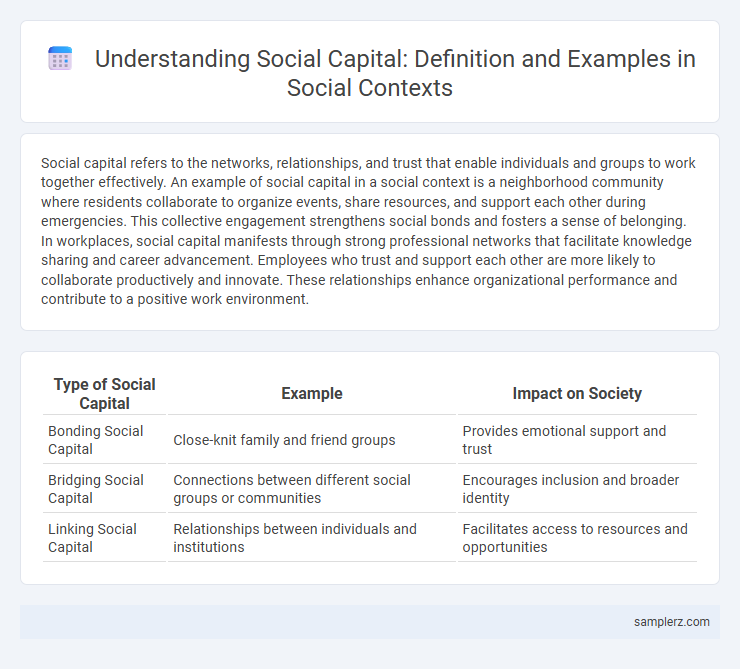Social capital refers to the networks, relationships, and trust that enable individuals and groups to work together effectively. An example of social capital in a social context is a neighborhood community where residents collaborate to organize events, share resources, and support each other during emergencies. This collective engagement strengthens social bonds and fosters a sense of belonging. In workplaces, social capital manifests through strong professional networks that facilitate knowledge sharing and career advancement. Employees who trust and support each other are more likely to collaborate productively and innovate. These relationships enhance organizational performance and contribute to a positive work environment.
Table of Comparison
| Type of Social Capital | Example | Impact on Society |
|---|---|---|
| Bonding Social Capital | Close-knit family and friend groups | Provides emotional support and trust |
| Bridging Social Capital | Connections between different social groups or communities | Encourages inclusion and broader identity |
| Linking Social Capital | Relationships between individuals and institutions | Facilitates access to resources and opportunities |
Community Volunteering: Strengthening Social Bonds
Community volunteering fosters social capital by building trust, reciprocity, and networks among participants, enhancing overall community resilience. Active involvement in local projects connects individuals from diverse backgrounds, promoting collaboration and shared goals. This collective engagement strengthens social cohesion, leading to improved access to resources and support within the community.
Neighborhood Watch Programs: Building Trust and Safety
Neighborhood Watch Programs enhance social capital by fostering trust and cooperation among community members, leading to safer environments. These programs facilitate open communication channels between residents and local law enforcement, increasing collective efficacy in crime prevention. The active participation in such initiatives strengthens social bonds and creates a resilient network that supports communal well-being.
Alumni Networks: Leveraging Shared Connections
Alumni networks exemplify social capital by fostering trust and cooperation through shared educational backgrounds and professional experiences. These networks enable members to access valuable resources, job opportunities, and mentorship, enhancing career growth and community engagement. Leveraging shared connections within alumni groups strengthens social cohesion and facilitates collaboration across diverse industries.
Cooperative Businesses: Collective Action for Mutual Benefit
Cooperative businesses exemplify social capital by fostering trust, reciprocity, and shared values among members who collaborate for mutual economic benefit. These enterprises leverage collective action to pool resources, reduce individual risks, and enhance community resilience. Studies show that cooperatives improve social cohesion and increase access to markets, empowering participants through democratic governance and equitable profit distribution.
Social Clubs and Interest Groups: Fostering Belonging
Social clubs and interest groups exemplify social capital by creating networks that foster a strong sense of belonging and mutual support among members. These organizations facilitate shared values, trust, and cooperation, enhancing community cohesion and social engagement. Participation in such groups builds social ties that contribute to individual well-being and collective resilience.
Mentoring Relationships: Transferring Social Resources
Mentoring relationships serve as a vital example of social capital by facilitating the transfer of knowledge, skills, and social networks between individuals. These connections enhance career development and personal growth by providing access to valuable resources, guidance, and support. Through sustained interaction, mentees gain social trust and increased opportunities, reinforcing community cohesion and individual success.
Crowdfunding Initiatives: Mobilizing Community Support
Crowdfunding initiatives exemplify social capital by leveraging trust and networks within communities to mobilize financial support for projects and causes. Platforms like Kickstarter and GoFundMe harness collective engagement, enabling individuals to contribute resources based on shared values and social connections. This mobilization strengthens community bonds and fosters a culture of collaboration and mutual aid.
Faith-Based Organizations: Enhancing Social Cohesion
Faith-based organizations cultivate social capital by fostering trust, mutual support, and strong community networks among members through shared beliefs and values. These organizations facilitate social cohesion by organizing community activities, charity work, and interfaith dialogues that promote inclusion and collective well-being. The resulting social capital enhances resilience, cooperation, and resource exchange within diverse populations.
Online Communities: Creating Virtual Social Capital
Online communities foster virtual social capital by enabling trust-building and collaboration among diverse members across geographical boundaries. Platforms like Reddit and Facebook Groups facilitate knowledge-sharing, collective problem-solving, and the formation of supportive networks. This digital social capital enhances social cohesion and access to resources, driving social and economic benefits within and beyond the online environment.
Parent-Teacher Associations: Bridging School and Community
Parent-Teacher Associations (PTAs) exemplify social capital by fostering collaboration between educators and families to enhance student success. These groups facilitate trust, shared norms, and networks that empower community engagement in educational initiatives. PTAs strengthen social cohesion, enabling resource sharing and collective problem-solving within the school environment.

example of social capital in social Infographic
 samplerz.com
samplerz.com